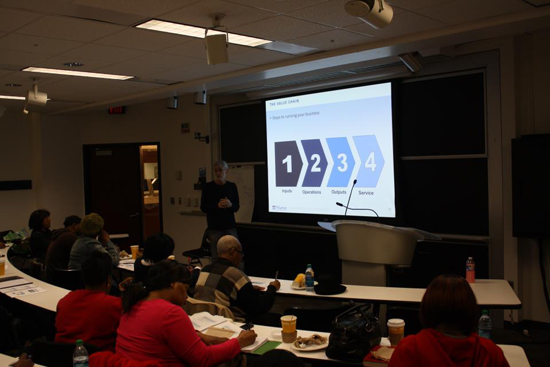Journeys with a Taoist in the Business World: Strategies of the Wu-wei

Photo: Professor Weigelt teaching financial literacy to inner city adults at The Wharton School
Wu-wei is a verb of sorts. It explains how one behaves strategically with what the Taoists call no action. It is the act of doing nothing by acting naturally -- but by acting naturally, getting things done. Unfortunately, acting naturally does not mean following one's own groove. There are laws to follow because you are part of a bigger picture, that of nature. And, you need to be in harmony with nature to practice wu-wei.
Sometimes it is nature's nature to make wu-wei easily noticeable, think of gravity. All objects are wu-wei with gravity, even innate ones like water and rocks. Like anything, gravity can be overcome, but only by using greater resources.
A Taoist philosopher tells of wu-wei:
"In as much a large body of water spreads to nurture the myriad things, yet it does nothing."
The water does nothing because it is wu-wei with gravity and follows the contours of the land. The fact that it nurtures is a consequence of gravity (an element of the Tao). Even if it didn't nurture, water always respects gravity. Water is wu-wei with it regardless of consequence -- from producing cheap hydro-electricity to deadly Tsunami waves
Wu-wei exists in everything, not only nature. Those that excel in strategy know and follow the principles of its nature. They create favorable situations and act accordingly. A competent strategist engages in no action when she follows these principles. Think of the difference between pushing a rock downhill relative to uphill. When going downhill you use the physical law of gravity to create a favorable situation. The task is easier. In pushing a rock uphill you go against the natural law. You can reach your goal, but only by consuming more resources. It is the same for strategy.
Following nature, we created the Reduce the Wealth Gap campaign to address the need to increase investment returns of the urban poor. We first provide business education and then create investment opportunities for our graduates. In January, 2012 we started the campaign with a small venture in West Philadelphia, the poor community adjacent to The Wharton School. We offered a nine week curriculum covering financial literacy, leadership development, and entrepreneurship. Participants were given small incentives to finish program modules. Graduates of the program were offered the opportunity to form micro -savings and -investing groups.
Micro-saving groups are widely used in Africa to increase the wealth of the very poor. Working with Oxfam America we adapted the concept to the U.S. urban market. We believe these groups will generate returns of over 10% for its members. Micro-investing groups are structured to give the poor greater access to cheap financial products, like mutual funds. These should also generate long-term returns of greater than 6%. The main barrier to the poor is the high entry cost into the funds (commonly $2500 or $3000). Using a sustainable mechanism, we encourage donors to join a micro-investing group and provide the cost of entry.
During the nine weeks of the pilot class, participants increased from 35 to 60 participants, with 56 graduates (attended at least 8 of the 9 sessions). From these graduates, we are creating the first savings and investing groups. Though membership is being finalized, there will be a minimum of 12 members in each group. We will report on the progress of these groups in future blogs. We hope to attract 200 participants to our second program offering this September.
This is wu-wei in strategy.